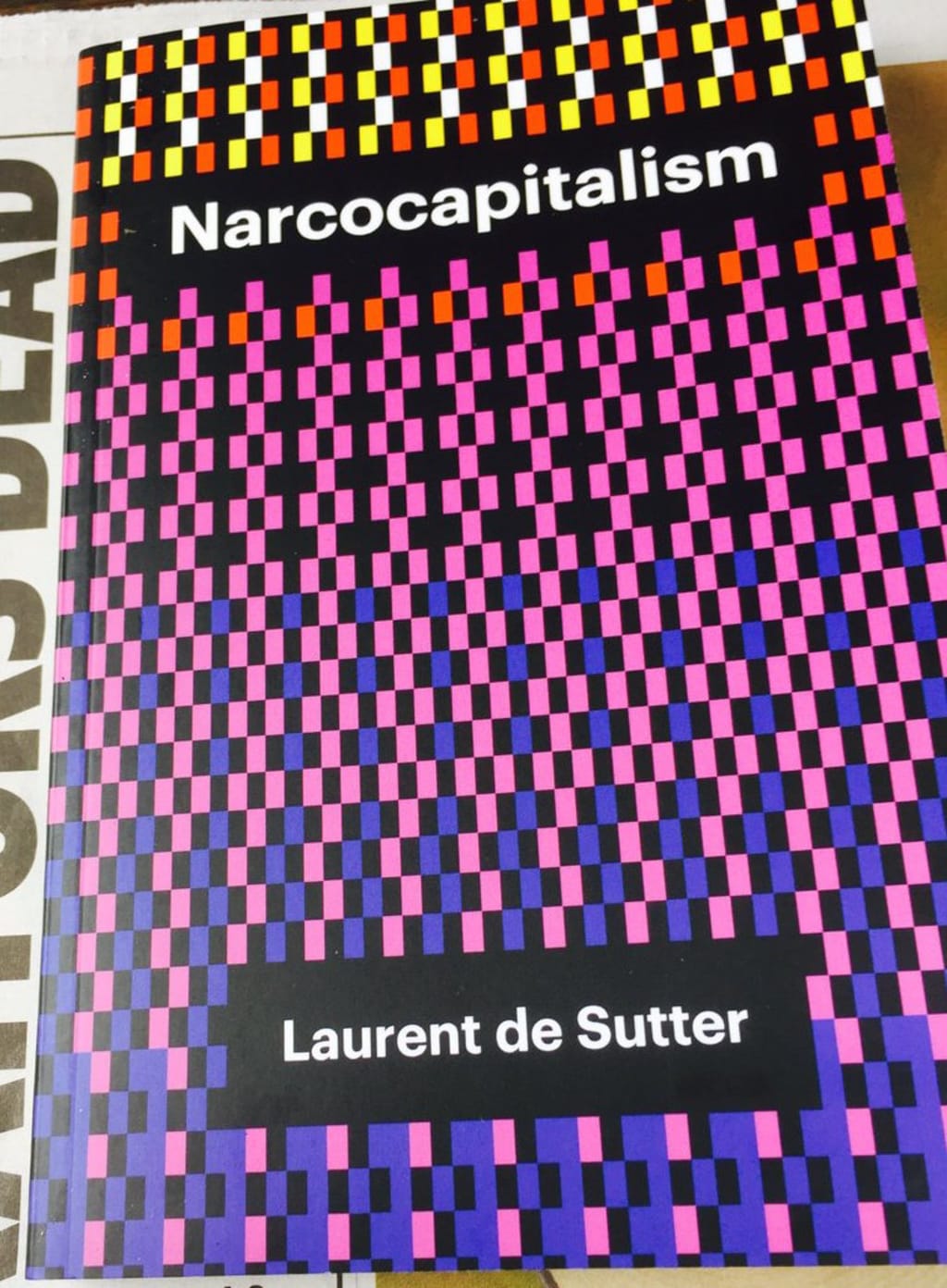'Narcocapitalism,' by Laurent de Sutter
A Review

I have this (bad?) habit of reading several books at the same time and hence sometimes ideas from different books interweave in my head creating strange patrons. While reading Narcocapitalism (Polity, 2017) by Laurent de Sutter, I also started reading a book about cinema titled Slow Movies’ by Ira Jaffe. In the introduction, Jaffe explains how Gilles Deleuze encountered in Italian neorealism and later in Michelangelo Antonioni, a more real cinema, closer to the experience of time as we live it, as opposed to Hollywood films and its saturation of time and space, its sometimes but not always welcomed unreality.
My experience in reading Narcocapitalism follows the opposite path, by assuming that nowadays real life is not anymore synonym of quietness but rather of noise, haste, and frantic images, and paradoxically there is no time to truly appreciate the passage of time, when I take a book, particularly an academic book, I am seeking for that deliberate and familiar rhythm, that slowness and stillness, and that space for reflection which, more and more often, I solely find in books. And that is precisely the only thing I miss in Narcocapitalism, since in my opinion, the author misses an excellent opportunity to tackle in depth some of the subjects.
To be honest, I have to confess my profound contempt for anything similar to an abridged version of a book, any attempt to simplify it for whatever noble reason (Moby Dick in only 100 pages without digressions about marine life, Decadence and Fall of the Roman Empire but cutting off some decadence so it is not that long, or those books that explain the entire philosophy of Kant, Spinoza, or Derrida in 90 minutes). Just like I think that an abridged version is an aberration I find troublesome when books are forced to renounce to some of their essence to become something else that is consonant with the demands of market and society. To explain myself, I believe books are without discussion, the most perfect tool for intellectual argumentation, critical thinking, and elaborating new ideas, the best way of explaining your own thinking or to understand other's. Too often, I have noticed a certain trend among publishers and writers to lighten up books both in content and in physical weight. In general I find this search for brevity and concretion more disturbing than helpful, and more a concession to the internet era and its new reading habits, to the restless readers, and to the commonplace balderdash of the lack of time to read. De Sutter, who in general does an estimable work, sometimes prefers to tiptoe around the subject for the sake of such brevity and sacrifices depth and vehemence.
Having said all this, the book tells how the story of pharmacology and the formation of contemporary capitalism run parallel to each other. The anaesthetization can be read at two different levels, one more literal that explains how people’s abuse of drugs and medicines contributes to create a narcotised society, and secondly can be interpreted as a metaphor for contemporary neoliberal politics and its aptitude to keep society in a permanent state of numbness, not providing any room for dissent or radical politics while at the same make us believe naively that we are in fact getting involved in some sort of grassroot politics just for sharing some articles on the internet and attend two conferences.
These two facets will combine playing with the idea that a social body that is calmed or de-excited, is always easier to manipulate. States, corporations, and politicians have found in narcotics and its use outside medicine, an excellent apparatus for control and repression, one that allows them to bring into being more productive workers and efficient consumers, one that would make Michel Foucault proud. The similarities that Foucault found between the birth control pills display and Jeremy Bentham’s panopticon contemplate sinisterly to us. To the point, that the discovery and implantation of the birth control pill that is obviously considered a milestone in the feminist movement and a great social advance, can also be read as a manoeuvre that facilitates greater control over private and familiar life, and the liberation that supposes for women to enter the labor market can be also seen as an opportunity to increase productivity and competition. The devastating conclusion is that sometimes the social advances that seem to occur due to popular pressure, to the awareness of citizens, and to the struggle for rights, could be simply orchestrated by organaizations and governemnts with spurious interests.
Today, an unknown, but certainly high, percentage of the population has an unrecognised dependency on some legal drug. Accusations that society seems to be lethargic and indifferent to an array of problems may have an origin more physical than metaphysical, and the reasons for this lethargy could be other than mere disinterest or apathy, what suggests we live in a society still more dystopian than we already imagine. Depression, anxiety, insomnia, stress, fatigue are buried under mountains of medicines and never cured but the persons who suffer of these diseases are considerate, as chronically ill, condemned for life to ingest drugs that modify their character, moods, and sensations. People who are too excited, too sad, too sick, and too tired are described as abnormal and consequently labeled, cataloged and stuffed with pills to prevent the epidemic of abnormality from spreading. In this way, once again, we can change everything so that everything remains the same.
The particularity and specificity of the drug manufacture disrupt any form of resistance or alternative movement, and erase all possibility of an ethical competence, leaving instead open ground for insatiable pharmaceutical multinationals. Only the states, usually last responsible for the distribution of medicines and for their respective national health systems seem able to exercise some control, but every day that passes any attempt by a national state to restrain the market mechanisms seems highly unlikely.
Narcocapitalism is an absorbing reading for anyone interested in history, psychoanalysis, philosophy or economics, so almost for everyone. The author presents his arguments clearly and brings the discussion to the table, even though the purpose seems to be of initiating the debate rather than coming to a final conclusion. His main strength is how is able to put together two fields that generally follow separate ways, such as politics and psychoanalysis. The ineludible interaction of one’s body with the social mind and of one’s mind within the collective conscious highlight the undeniable importance of the private sphere in politics and viceversa. After finishing the reading, I cannot help thinking that although de Sutter establishes relevant connections he forgets that these relations do not always determine causality nonetheless his approach and originality is praiseworthy.






Comments
There are no comments for this story
Be the first to respond and start the conversation.